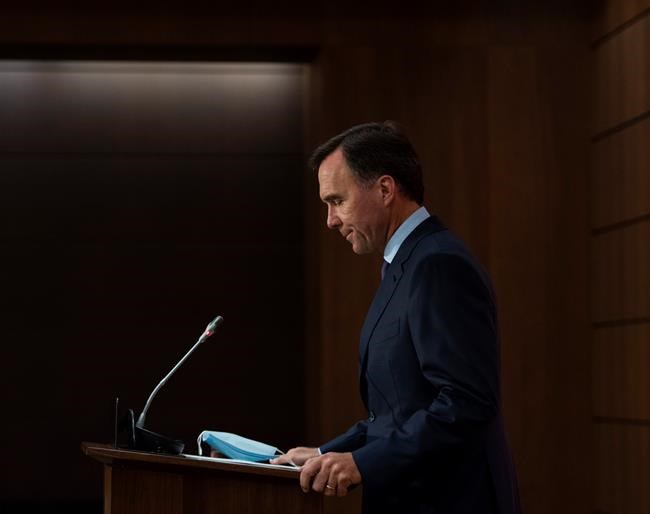Bill Morneau leaves cabinet, federal politics, as suddenly as he arrived
Advertisement
Read this article for free:
or
Already have an account? Log in here »
To continue reading, please subscribe:
Monthly Digital Subscription
$0 for the first 4 weeks*
- Enjoy unlimited reading on winnipegfreepress.com
- Read the E-Edition, our digital replica newspaper
- Access News Break, our award-winning app
- Play interactive puzzles
*No charge for 4 weeks then price increases to the regular rate of $19.00 plus GST every four weeks. Offer available to new and qualified returning subscribers only. Cancel any time.
Monthly Digital Subscription
$4.75/week*
- Enjoy unlimited reading on winnipegfreepress.com
- Read the E-Edition, our digital replica newspaper
- Access News Break, our award-winning app
- Play interactive puzzles
*Billed as $19 plus GST every four weeks. Cancel any time.
To continue reading, please subscribe:
Add Free Press access to your Brandon Sun subscription for only an additional
$1 for the first 4 weeks*
*Your next subscription payment will increase by $1.00 and you will be charged $16.99 plus GST for four weeks. After four weeks, your payment will increase to $23.99 plus GST every four weeks.
Read unlimited articles for free today:
or
Already have an account? Log in here »
Hey there, time traveller!
This article was published 17/08/2020 (1939 days ago), so information in it may no longer be current.
OTTAWA – William Francis Morneau leaves federal politics as suddenly as he burst onto the Ottawa scene less than five years ago.
In November 2015, the newly elected Liberal member for Toronto Centre became the first rookie MP in nearly a century to step into the high-profile and demanding role of finance minister.
He set about implementing pillars of Prime Minister Justin Trudeau’s economic platform, including tax cuts for the middle class, the new Canada Child Benefit and a revamped Canada Pension Plan.

Morneau brought ample experience as a business leader and volunteer to the role.
He took the reins of the family business from his father, growing human resources firm Morneau Shepell to 4,000 employees from just 200.
Morneau was also a keen supporter of the arts, and worked to help at-risk youth and ensure better access to health care and education. He also helped found a school for Somali and Sudanese girls at a United Nations High Commissioner for Refugees camp in northern Kenya.
In the rough-and-tumble world of parliamentary politics, the deliberate and thoughtful finance minister was forced to learn fast.
While still honing his political chops, he rarely seemed far from one controversy or another.
It would prompt the opposition to try to paint the wealthy former businessman as out of touch with the realities of ordinary Canadians.
Morneau’s first budget projected years of big deficits despite Trudeau’s 2015 election promise to keep annual shortfalls under $10 billion.
A contentious tax-reform plan released in 2017 led to an outcry from enraged business owners, doctors, tax experts and even backbenchers within his own Liberal caucus.
“I’ve learned from this experience that we have to be very good at communicating to Canadians what it is that we’re trying to achieve,” Morneau said at the time.
There were also questions that year about the minister’s personal assets.
The federal ethics commissioner of the day fined Morneau $200 for failing to disclose his role as a director in a private corporation that owns a villa in France. Morneau had disclosed his ownership of the villa to Mary Dawson but, thanks to what his office called an administrative oversight, failed to mention the ownership structure itself.
Criticism intensified when word spread that he hadn’t placed his Morneau Shepell holdings into a blind trust after being named to cabinet — a decision Morneau insisted was framed by Dawson’s own advice.
In response to the controversy, Morneau sold off the remainder of his Morneau Shepell shares, which were worth about $21 million. He donated to charity the difference between what the shares were worth at the time of the sale and their value in 2015 when he was first elected — estimated at about $5 million — and promised to place his other assets in a blind trust.
In his final months as finance minister, Morneau oversaw massive spending to deal with economic and social fallout from the COVID-19 pandemic.
Morneau and Trudeau are both facing investigations by the new federal ethics watchdog, Mario Dion, for taking part in talks to hand WE Charity a contract to run a pandemic-related student-volunteer program.
One of Morneau’s daughters works for the organization, another has spoken at its events and his wife, Nancy McCain, has donated $100,000. Morneau also revealed last month that he had repaid WE some $41,000 in expenses for trips he and his family took in 2017 to view two of its humanitarian projects in Ecuador and Kenya.
In stepping down, the 57-year-old Morneau signalled a need for a new finance minister to take up the challenge of navigating Canada’s economy through the shoals of the pandemic.
“I will look forward to watching politics from the outside, and hopefully contributing in another way.”
This report by The Canadian Press was first published Aug. 17, 2020.


